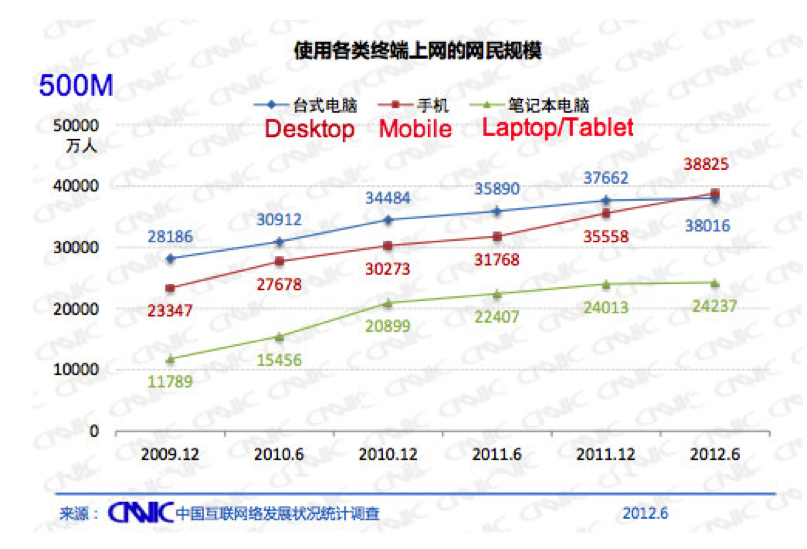LAT recently hosted its second meetup on the theme of “Getting Started on Chinese Mobile Apps” #VMMCN. This well attended workshop was an extension of our earlier presentation entitled 5 Reasons Your Marketing Plan Needs to Include Sina Weibo. The discussion focused on the importance of integrating mobile apps into a company’s marketing strategy, and introduced three of the most popular Chinese mobile apps: QQ, WeChat, and Sina Weibo.

Why Do Mobile Apps Matter?
Desktop computers have always been the first choice for Chinese people wanting to access Internet. However, the situation reached a crossroad in June 2012. Mobile users climbed up to 388 million while desktop users dropped down to 380 million. The main cause was the increasing number of mobile users in rural China, who turned to smartphones because of their affordability and convenience. Since half of China’s population is rural, a behavioural change has a substantial overall impact.

Great Internet Divide: Social elites vs. Digital peasants
One thing to keep in mind is the different ways in which urban and rural residents use the Internet. As described in The Story of W&L: China’s Great Internet Divide, rural workers work hard and turn to the Internet for entertainment, while urban white collars integrate Internet into their work and daily life. Therefore, rural workers are more willing to spend money on Internet products as a way to temporarily escape their harsh reality. In contrast, urban residents look for and use Internet products that are free.
Top 10 Most Popular Chinese Mobile Apps
Among the top 10 most popular Chinese mobile apps, Tencent and Alibaba are the two biggest winners. Almost half of the top 10 apps are from Tencent, including QQ, and WeChat. Alibaba’s Taobao and Alipay are payment gateways that help users spend money online, indicating the growing popularity of e-commerce. It is worth noting that not a single western app made the list due to government censorship and non-localized content. Therefore, it is essential for companies to set up accounts and run marketing campaigns on Chinese social platforms if they want to reach Chinese consumers.
Top 3 most popular mobile social apps:
NO.1 Tencent’s IM QQ
QQ, an instant messaging app similar to Skype, has the largest user base in China: 798.2 million registered users by March 2013 and over 200 million people active on the platform every day. It features instant messaging and free video chat functions. The majority of QQ users are young rural residents.
Businesses use QQ to provide customer service and support. By clicking the QQ icon on a merchant’s website, customers can live chat with its support team.
Are you thinking about opening an online retail store for Chinese consumers? Set up a QQ account to provide a better experience for your customers.
NO.2 Tencent’s WeChat
WeChat was launched in 2011 and quickly went viral. It has more than 400 million users, including 70 million overseas. WeChat users are mostly well-educated and urban, white collar workers. It features hybrid functions of Skype, Whatsapp, Instagram, and Facebook and is well known for its walkie-talkie capability. Instead of typing, people can easily leave short voice messages to one another around the world with zero cost.
Businesses set up WeChat accounts to reach consumers directly. By pushing out a sms-like message to individual smartphones, brands can have one-on-one conversations with their customers. More information about marketing on WeChat can be found here.
NO. 3 Sina Weibo
Sina Weibo started as a web based social application and now has over 500 million registered users. Weibo is gradually shifting its focus from desktop to mobile platform; it launched a mobile version and added third-party app support. Almost half of the Fortune 500 companies have Sina Weibo accounts and they are constantly communicating with fans online. Learn more about businesses on Sina Weibo in our previous blog post.
Chinese social media is relevant for marketers who wish to reach local Chinese customers as well as overseas. Recent and ongoing waves of Chinese immigrants coming from Mainland China continue to be active on Chinese networks even after they move. They love to share images and news about their life in North America.
E-commerce is a rising star in China, especially after Alibaba took 18% stakes in Sina Weibo. Interested in learning more? Contact Us! Our team of Chinese marketing experts will be happy to meet with you and discuss how e-commerce platforms can help your business or organization reach and engage with Chinese customers.




